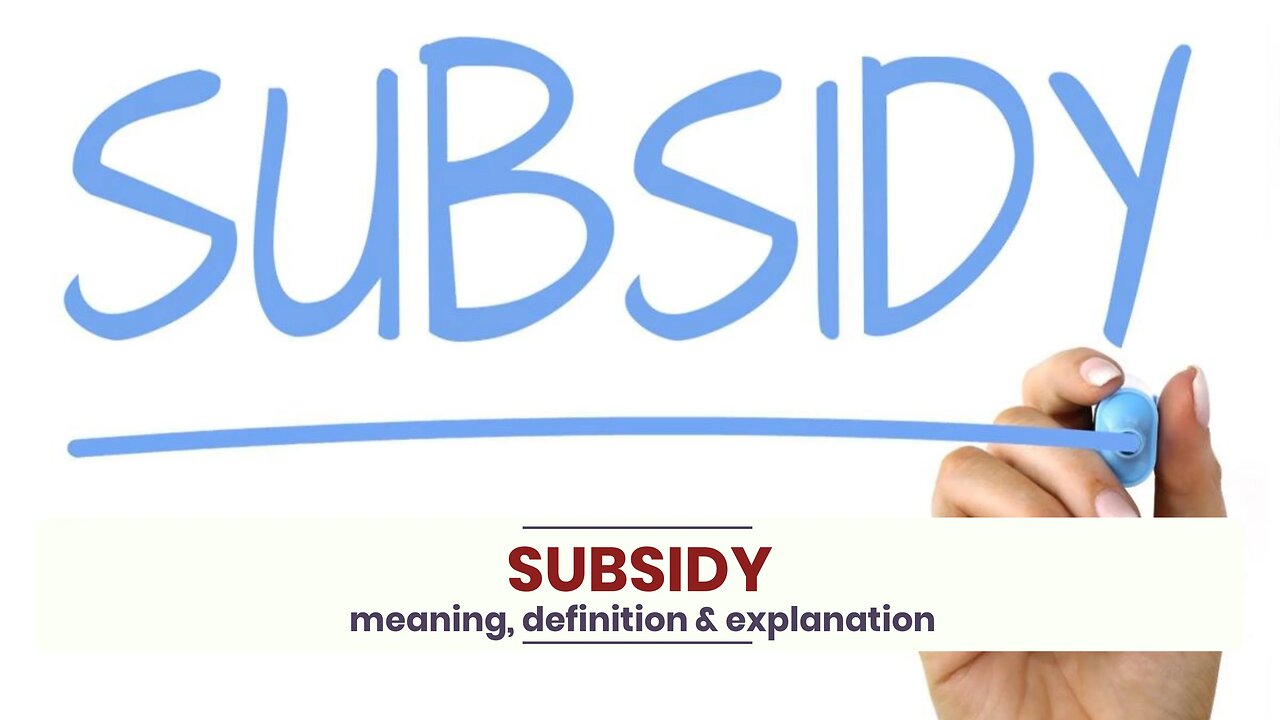Premium Only Content

What is SUBSIDY?
✪✪✪✪✪
http://www.theaudiopedia.com
✪✪✪✪✪
What is SUBSIDY? What does SUBSIDY mean? SUBSIDY meaning - SUBSIDY definition - SUBSIDY explanation - SUBSIDY pronunciation. What is the meaning of SUBSIDY? What is the definition of SUBSIDY? What does SUBSIDY stand for? How to pronounce SUBSIDY? What is SUBSIDY meaning? What is SUBSIDY definition?**
A subsidy or government incentive is a type of government expenditure for individuals and households, as well as businesses with the aim of stabilizing the economy. It ensures that individuals and households are viable by having access to essential goods and services while giving businesses the opportunity to stay afloat and/or competitive. Subsidies not only promote long term economic stability but also help governments to respond to economic shocks during a recession or in response to unforeseen shocks, such as the COVID-19 pandemic.
Subsidies take various forms— such as direct government expenditures, tax incentives, soft loans, price support, and government provision of goods and services. For instance, the government may distribute direct payment subsidies to individuals and households during an economic downturn in order to help its citizens pay their bills and to stimulate economic activity. Here, subsidies act as an effective financial aid issued when the economy experiences economic hardship. They can also be a good policy tool to revise market imperfections when rational and competitive firms fail to produce an optimal market outcome. For example, in an imperfect market condition, governments can inject subsidies to encourage firms to invest in R&D (research and development). This will not only benefit the firms but also produce some positive externalities such that it benefits the industry in which the firms belong, and most importantly, the society at large.
Although commonly extended from the government, the term subsidy can relate to any type of support – for example from NGOs or as implicit. Subsidies come in various forms including: direct (cash grants, interest-free loans) and indirect (tax breaks, insurance, low-interest loans, accelerated depreciation, rent rebates). Furthermore, they can be broad or narrow, legal or illegal, ethical or unethical. The most common forms of subsidies are those to the producer or the consumer. Producer/production subsidies ensure producers are better off by either supplying market price support, direct support, or payments to factors of production. Consumer/consumption subsidies commonly reduce the price of goods and services to the consumer. For example, in the US at one time it was cheaper to buy gasoline than bottled water.
All countries use subsidies via national and sub-national entities through different forms such as tax incentives and direct grants. Likewise, subsidies have an economic influence on both a domestic and international level. On a domestic level, subsidies affect the allocation decision of domestic resources, income distribution, and expenditure productivity. On an international level, subsidies may increase or decrease international interaction and integration through trade. For this reason, having a thorough subsidy policy is essential as its inadequacy can potentially lead to financial hardship and problems for not only the poor or low income individuals but the aggregate economy as a whole.
-
 1:52
1:52
The Audiopedia
10 months agoWhat is EXECUTIVE DIRECTOR?
531 -
 LIVE
LIVE
Mally_Mouse
2 hours agoSaturday Shenanigans!! - Let's Play: Liars Bar + Others!
143 watching -
 LIVE
LIVE
Dragoon_B
1 hour agoDragoon - The Quadra-Threat Challenge
50 watching -
 24:55
24:55
MYLUNCHBREAK CHANNEL PAGE
6 hours agoDams Destroyed China
34.3K28 -
 LIVE
LIVE
ItsLancOfficial
5 hours ago🔴Live Blood Strike Top 250 &Tarkov | Ranking + Scaving
50 watching -
 5:21:22
5:21:22
JdaDelete
19 hours ago $2.42 earnedHappy Birthday Sonic - Sega Saturday
35.9K3 -
 56:28
56:28
Tactical Advisor
8 hours agoEx Content Creator Talks About Why He Quit | Vault Room LIve Stream 021
54.4K5 -
 2:28:24
2:28:24
Darkhorse Podcast
7 hours agoRise of the Cosplaymanauts: The 272nd Evolutionary Lens with Bret Weinstein and Heather Heying
40.3K77 -
 1:22:23
1:22:23
RiftTV/Slightly Offensive
6 hours ago $2.88 earnedWill the FUTURE Be Controlled by BITCOIN? | Guest: Max Keiser
29.2K17 -
 1:34:46
1:34:46
Michael Franzese
23 hours agoIs Luigi’s Death Penalty Justified or Politically Driven?
60.2K95